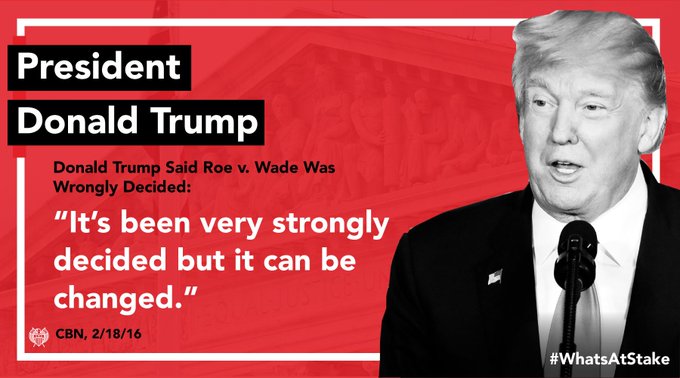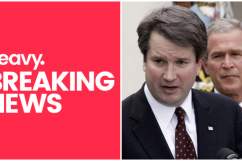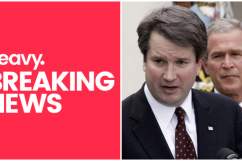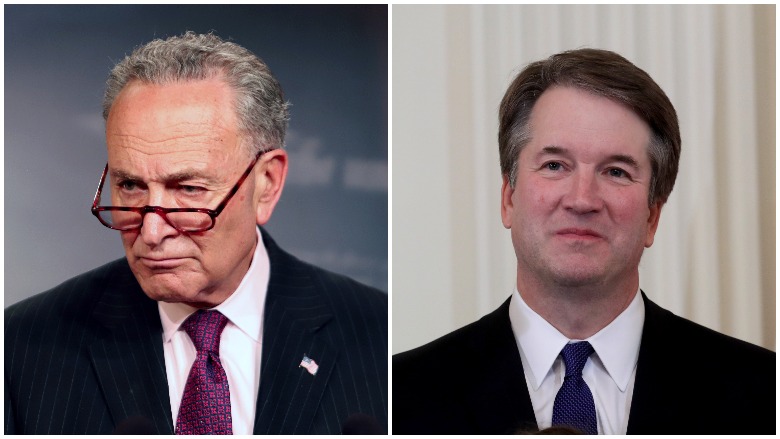
Senate Minority Leader Chuck Schumer has been opposing Judge Brett Kavanaugh for more than a decade. That opposition has only intensified now that Kavanaugh is President Trump’s nominee to the Supreme Court.
In 2003, Senator Schumer strongly opposed putting Kavanaugh on the D.C. Circuit Court. It took three years before the Senate let him through to the bench. During a confirmation hearing in 2004, Schumer remarked that Kavanaugh’s nomination to the appeals court was “not just a drop of salt in the partisan wounds, it is the whole shaker.”
The senator is repeating those assertions now. He put out a statement on Twitter that reads in part, “I will oppose Judge Kavanaugh’s nomination with everything I have, and I hope a bipartisan majority will do the same. The stakes are simple too high for anything else.”
For his part, Judge Kavanaugh has always denied the notion that his personal views impact his judicial decisions. In 2004, he responded to Senator Schumer by saying, “I firmly disagree with the notion that there are Republican judges and [Democratic] judges. There is one kind of judge. There is an independent judge under our Constitution.”
After President Trump announced him as the Supreme Court nominee, Kavanaugh stressed if confirmed he would uphold the Constitution and be politically impartial when making decisions. “A judge must be independent and must interpret the law, not make the law… I will tell each senator that I revere the Constitution. I believe that an independent judiciary is the crown jewel of our constitutional republic. If confirmed by the Senate, I will keep an open mind in every case and I will always strive to preserve the Constitution of the United States and the American rule of law.”
Here’s what you need to know.
1. Schumer: Kavanaugh’s Confirmation Would Put Women’s Reproductive Rights on the “Judicial Chopping Block”
Senator Schumer fired away at Brett Kavanaugh after his nomination was announced. He wrote that President Trump’s selection “has put reproductive rights and freedoms and health care protections for millions of Americans on the judicial chopping block.”
Schumer’s statement also included, “Judge Kavanaugh got the nomination because he passed this litmus test, not because he’ll be an impartial judge on behalf of all Americans. If he were to be confirmed, women’s reproductive rights would be in the hands of five men on the Supreme Court.”
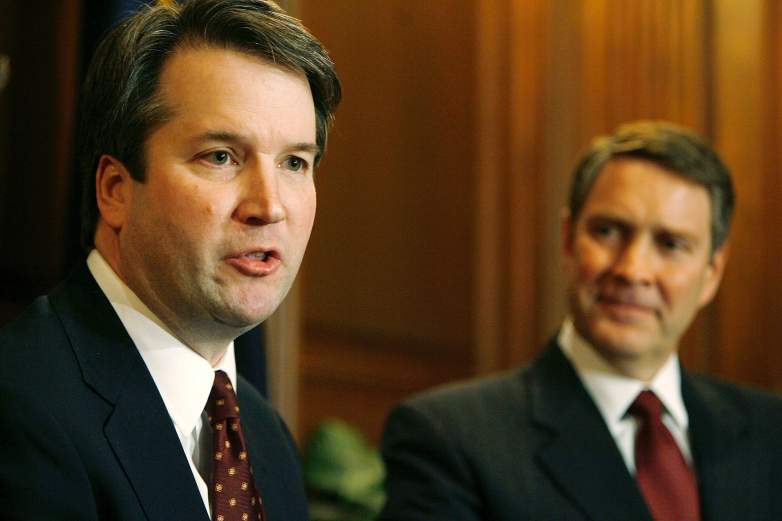
GettyBrett Kavanaugh (left) in 2004.
Kavanaugh has dissented on abortion cases while a judge on the D.C. Circuit Court, however conservatives have criticized him for not being forceful enough in his opposition. One of those dissents occurred in 2015, over then-President Obama’s contraceptive mandate. Under the Affordable Care Act, employers had to provide FDA-approved contraception at no cost. Critics argued this violated religious liberties. Kavanaugh agreed with that assessment, writing that it was unconstitutional and violated the rights of religious organizations. The D.C. Court refused to reconsider a challenge to the contraception mandate.
Then in 2017, Kavanaugh disagreed with the majority in a case that allowed an undocumented teenage immigrant access to an abortion while she was in federal custody. In his dissent, Kavanaugh wrote that he did not want the case to create a new constitutional precedent on the issue. He wrote that the majority had created a “new right for unlawful immigrant minors in U.S. government detention to obtain immediate abortion on demand.” However, Kavanaugh did not argue with the teenager’s general right to have an abortion, something conservatives blasted him for.
During his confirmation hearing for the D.C. Circuit, Kavanaugh took a cautious route on the subject as well. He told senators then “I would follow Roe v. Wade faithfully and fully. That would be binding precedent of the court. It’s been decided by the Supreme Court.”
2. Kavanaugh’s Confirmation Could Be a Big Win for Corporations
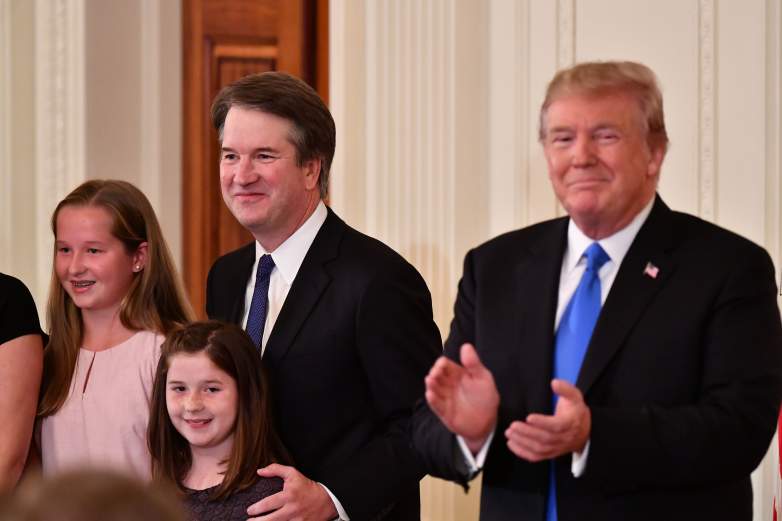
Supreme Court nominee Brett Kavanaugh, his wife Ashley Estes Kavanaugh (off frame) and their two daughters stand by US President Donald Trump after he announced his nomination in the East Room of the White House on July 9, 2018 in Washington, DC. (Photo by MANDEL NGAN / AFP) (Photo credit should read MANDEL NGAN/AFP/Getty Images)
Judge Kavanaugh’s nomination to the Supreme Court is seen as a big win for big businesses. According to Adam Feldman of the Empirical SCOTUS blog, Kavanaugh “has written almost entirely in favor of big businesses, [and] employers in employment disputes.”
Kavanaugh has been a constant critic of the federal government’s assumed right to implement regulations on businesses. He also questions the constitutionality of the Consumer Financial Protections Bureau, the watchdog agency created under the Obama administration. In a dissenting opinion in 2016, over more than 50 pages of text, Kavanaugh argued that the CFPB had been granted too much individual power. “The director of the CFPB possesses more unilateral authority – that is, authority to take action on one’s own, subject to no check – than any single commissioner or board member in any other independent agency in the U.S. government. The CFPB’s concentration of enormous executive power in a single, unaccountable, unchecked director not only departs from settled historical practice, but also poses a far greater risk of arbitrary decision-making and abuse of power, and a far greater threat to individual liberty, than does a multi-member independent agency.”
Another opinion that President Trump would have liked is that Kavanaugh opposes net neutrality. That rule prevented internet providers from slowing or blocking service to certain websites. The Federal Communication Commission voted to repeal net neutrality rules in December 2017, and they expired in April. In a 2017 dissent opinion, Kavanaugh argued that net neutrality violated the first amendment rights of the internet service providers. “Internet service providers may not necessarily generate much content of their own, but they may decide what content they will transmit, just as cable operators decide what content they will transmit.”
Senator Schumer’s statement opposing Judge Kavanaugh’s nomination to the Supreme Court also included a reference to his past judgements in favor of businesses. “This nomination could alter the balance of the court in favor of powerful special interests and against working families for a generation, and would take away labor, civil, and human rights from millions of Americans. We cannot let that happen.”
3. Kavanaugh Has Drawn Criticism For his Stance on Privacy
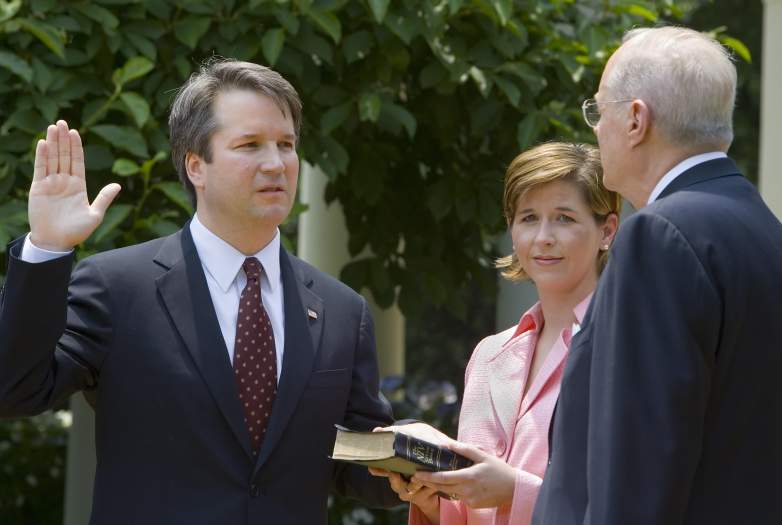
GettyBrett Kavanaugh sworn in as a US Court of Appeals Judge for the District of Columbia June 1, 2006
Judge Kavanaugh’s interpretation of the 4th amendment has drawn criticism from both sides of the political spectrum. He defended the NSA’s controversial surveillance program in a 2015 opinion. The agency’s practice of collecting phone calls was exposed by whistleblower Edward Snowden in 2013. Congress ultimately reigned in the agency’s power to collect such broad records.
Kavanaugh states that the NSA operation did not equal a “search.” But his concurrence opinion argues that even if it did, the government had the power to conduct such a search in order to defend against terrorism. “The Fourth Amendment does not bar all searches and seizures. It bars only unreasonable searches and seizures. And the Government’s metadata collection program readily qualifies as reasonable under the Supreme Court’s case law. The Fourth Amendment allows governmental searches and seizures without individualized suspicion when the Government demonstrates a sufficient “special need” – that is, a need beyond the normal need for law enforcement – that outweighs the intrusion on individual liberty.”
Conservative leader Ken Cuccinelli, president of the Senate Conservatives Fund, is among those who have expressed concern over Kavanaugh’s privacy views. He told the Washington Examiner, “I believe Judge Kavanaugh is an excellent judge, though certainly not a perfect one,” “His Fourth Amendment perspective is troubling. As someone who sued the NSA over their metadata gathering as a violation of the Fourth Amendment, he and I disagree on that point, and I think a lot of liberty-minded folks are going to have that as a major concern.”
Coincidentally, Kavanaugh’s stance on the NSA actually contradicts President Trump’s opinion on the matter. Trump recently criticized the NSA’s collection of phone records, tweeting, “Wow! The NSA has deleted 685 million phone calls and text messages. Privacy violations? They blame technical irregularities. Such a disgrace. The Witch Hunt continues!”
4. Kavanaugh Believes a Sitting President Cannot be Charged with a Crime
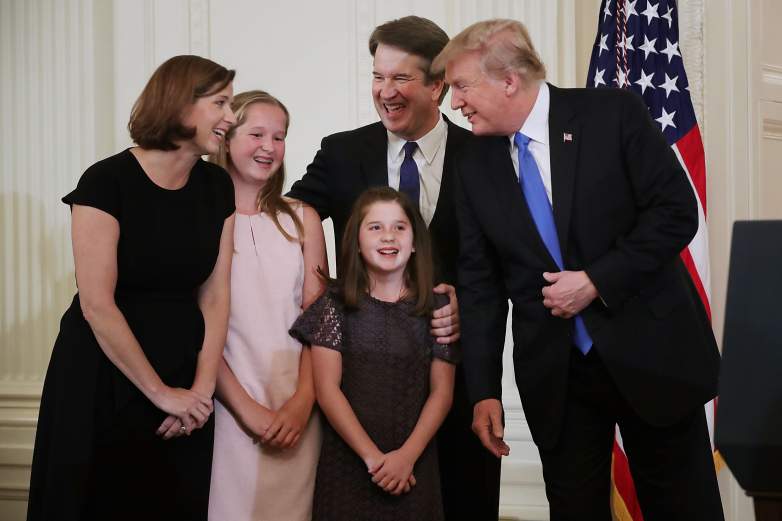
Getty U.S. President Donald Trump (R), Judge Brett M. Kavanaugh (2nd R), his wife Ashley Estes Kavanaugh and their daughters, Margaret and Liza, share a laugh after Trump announced the judge as his nominee to the United States Supreme Court during an event in the East Room of the White House July 9, 2018 in Washington, DC.
Judge Kavanaugh’s defense of executive powers is a concern for Democrats, especially amid the Russia investigation. He has written that his views have shifted since the 1990s, when he helped author Ken Starr’s report on President Bill Clinton. Kavanaugh called for broad impeachment powers and was involved in the proceedings against Clinton during the Monica Lewinsky scandal.
Since then, Kavanaugh has argued against indicting sitting presidents. In an article for the Georgetown Law Journal in 1998, he stated that the “President can be indicted only after he leaves office voluntarily or is impeached by the House of Representatives and convicted and removed by the Senate.”
In 2009, Kavanaugh also wrote in the Minnesota Law Review that the sitting president should be exempt from criminal prosecution and civil suits. His argument is that such a situation is distracting to the work of the office. “If the President does something dastardly, the impeachment process is available. No single prosecutor, judge, or jury should be able to accomplish what the Constitution assigns to the Congress. … The President’s job is difficult enough as is. And the country loses when the President’s focus is distracted by the burdens of civil litigation or criminal investigation and possible prosecution.”
5. GOP Leadership Has Acknowledged That Confirming Kavanaugh May Pose a Challenge
After President Trump announced Judge Kavanaugh as his pick for the Supreme Court, Senate Majority Leader Mitch McConnell expressed his support. He tweeted, “Judge Kavanaugh has won the respect of his peers in the legal community and demonstrates a firm understanding of the role of a judge in our republic. I look fwd to meeting w/ him and to the Senate’s thorough consideration of his nomination.”
However, in the days leading up to the president’s decision, Senator McConnell was urging Trump to pick someone else. The New York Times reported that McConnell expressed his concern that Kavanaugh’s long list of controversial opinions would delay his confirmation, as Democrats have a long list of documents to sift through. McConnell’s goal is to get a vote on the Supreme Court nominee before the midterm elections; the Kavanaugh choice could make that goal more difficult to achieve. Kavanaugh’s close ties with the Bush family was also a concern for McConnell, who reportedly expressed concern that senators will end up debating Bush-era controversies and Kavanaugh’s stances on them.
Other immediate responses to Judge Kavanaugh’s nomination from GOP lawmakers included:
Senator Rand Paul: “I look forward to the upcoming hearings, reviewing the record, and meeting personally with Judge Kavanaugh, with an open mind.”
Senator Susan Collins: “Judge Kavanaugh has impressive credentials and extensive experience… I will conduct a careful, thorough vetting of the President’s nominee to the Supreme Court.”
Senator John McCain: “Judge Brett Kavanaugh has impeccable credentials & a strong record of upholding the Constitution. He is widely respected as a fair, independent & mainstream judge. I look forward to the Senate moving forward with a fair & thorough confirmation process.”
Senator Rob Portman: “I look forward to considering the nomination of Judge Brett Kavanaugh to serve as the next Associate Justice of @USSupremeCourt. A #SCOTUS justice must fairly and impartially apply the law & protect the rights guaranteed of the Constitution. https://twitter.com/senrobportman/status/1016492647802920960

